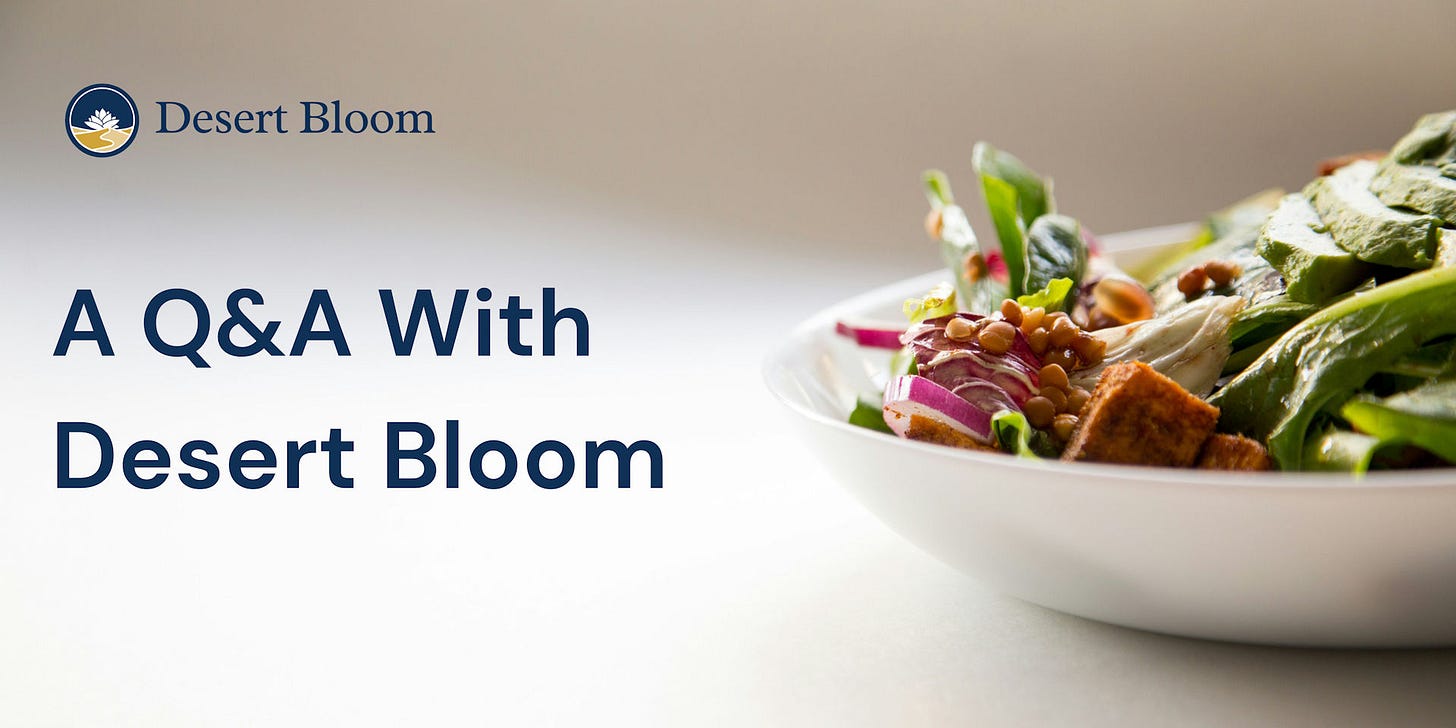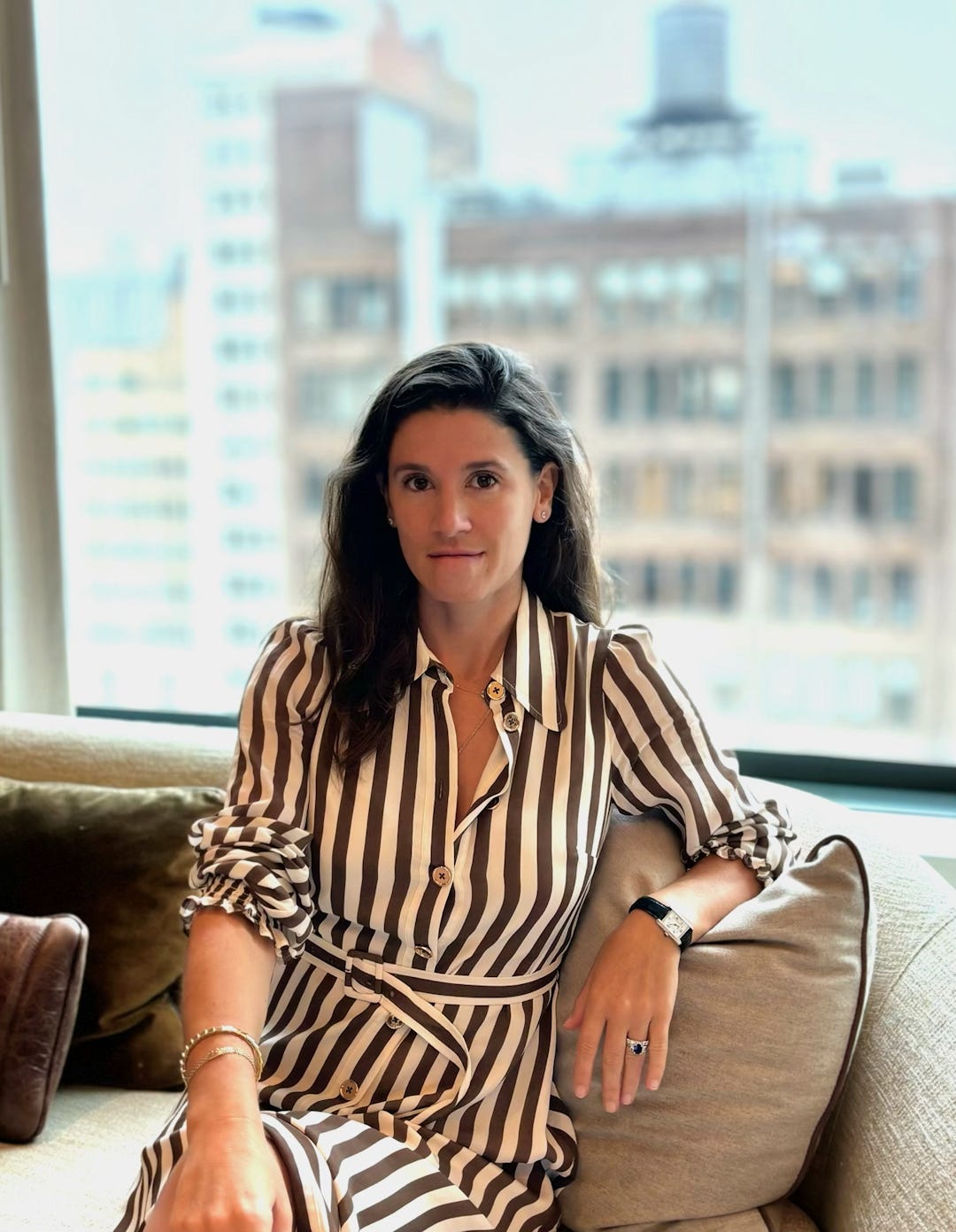This is part of our series spotlighting some of Third Nature’s best-in-class fund managers.
When we first set out to invest in food and agriculture over a decade ago, we focused on the high-growth, venture-friendly sectors—alternative proteins, fermentation, agtech, and other capital-light, tech-centric solutions. While many of these investments were successful, we found ourselves reflecting on the areas we hadn’t fully engaged with—specifically, the “last mile” of the food system.
These are the companies that directly shape our everyday food environment—emerging consumer brands, fast-casual restaurant chains, and other businesses that make healthier, more sustainable choices more accessible. Yet, because they don’t fit the typical VC mold (fast-scaling, 10x return potential), they’re often overlooked.
That’s why we were so excited when we met the team behind Desert Bloom Food Ventures.
Founded by seasoned food entrepreneurs—who built and sold the healthy food brand Tasty Bite to Mars—the firm is dedicated to backing the kinds of businesses that traditional investors tend to shy away from. These companies may require more time and capital, but they play a critical role in shaping consumer habits and shifting the food system from the ground up.
For us at Third Nature, Desert Bloom fills a key gap in the broader food and ag investment landscape. By supporting the companies that bring sustainable, nutritious food options to everyday consumers, they’re driving real, on-the-ground impact.
We sat down with Partner at Desert Bloom, Julia Paino, to discuss her team’s investment approach, the opportunities they see in the food environment, and how they’re helping build a healthier, more sustainable food system.
Tell us about your firm and investment thesis.
Desert Bloom Foods is a next-generation food investment firm dedicated to reshaping our food environment by supporting companies that are fundamentally transforming the way food is grown, distributed, and consumed. Our mission is to make food that is both healthy and environmentally regenerative ubiquitously available and accessible to everyone.
Our leadership team leverages decades of experience as both founders and investors, providing us with a unique perspective to identify and fill gaps in food innovation. Hans Taparia and Sohel Shikari co-founded Tasty Bite, a pioneering health food brand that they built over two decades into a market leader before its acquisition by Mars. And I founded Swoffle, a nationwide organic food company, and have been investing in the food and climate space for the past decade.
Our deep experience as both investors and operators gives us first-hand awareness of the systemic gaps in the food industry, allowing us to stay ahead of emerging trends and understand what it truly takes to build a successful, lasting business in this space. Rather than getting caught up in fleeting food fads, we focus on transformative, long-term change, investing in companies that break down structural barriers to healthy food access, eliminate harmful environmental externalities, and support regenerative agricultural and supply chain practices. The food industry today is dominated by a handful of corporations that have prioritized profit over health, environmental stability, and equity. Our mission is to direct capital toward businesses that actively challenge this status quo, creating a more resilient, equitable, and sustainable food system while building durable brands and business models that will define the future of food for generations to come.
Our investment thesis is centered on three core pillars:
Transforming the Food Environment: We invest in companies that fundamentally change the food landscape in everyday settings, from schools and offices to airports and highways, where unhealthy, ultra-processed food currently dominates.
Addressing Market Failures: Many of today’s food-related health and environmental crises stem from market failures—for example, the externalized costs of industrial agriculture or the inaccessibility of nutritious food in low-income communities. We back businesses that aim to reverse these failures by prioritizing long-term impact over short-term profit.
Systems-Level Impact: Our investments are designed to drive systemic change rather than addressing surface level issues. We look for companies that fundamentally improve supply chains, integrate regenerative agricultural practices, and redefine consumer expectations around food.
Why have you chosen to focus on food? What challenges are you seeking to address?
The food industry today is broken—dominated by unhealthy, over-processed food and extractive agricultural models that deplete soil health, accelerate climate change, and concentrate wealth in the hands of a few corporate giants. At Desert Bloom, we believe that regenerative models, innovative supply chains, and ethical business models are critical levers to shift this paradigm.
We have chosen to focus on sustainable, nutritious food production through a systems-based investing lens because it is a powerful case study and direct opportunity to address the following human and planetary challenges:
Deteriorating health tied to poor diet: Diet-related illnesses like obesity, diabetes, and cardiovascular disease are among the leading causes of death worldwide, disproportionately affecting marginalized communities that lack access to healthy food. By investing in companies like Everytable, which provides affordable, nutritious meals in historically underserved communities, we help correct systemic food inequities that, as a result, can directly improve public health outcomes.
Environmental degradation: Industrial agriculture is a leading driver of deforestation, soil degradation, and biodiversity loss. Regenerative agriculture, on the other hand, restores soil health, enhances biodiversity, and sequesters carbon. GoodSAM Foods, one of our most recent additions to the Desert Bloom portfolio, demonstrates how businesses can embrace regenerative farming at scale by working with smallholder farmers across multiple countries to implement indigenous, sustainable agricultural practices.
Economic disparities: Today’s global food system exploits both workers and farmers, often paying them unsustainable wages while concentrating profits at the top. We seek out companies that create equitable supply chains and redistribute economic power—whether through direct trade models, fair wages, or community ownership structures. Beyond Good, a Fund I portfolio company, is a powerful case study of how to create a sustainable supply chain that can redistribute economic power by operating a direct trade business model, sourcing cocoa directly from farmers in Madagascar and Uganda, eliminating middlemen and ensuring that farmers receive higher compensation.
Where do you glean strategic insights to fuel your investment approach and priorities?
We ensure that our decisions are deeply informed by both data and on-the-ground realities. We leverage a range of relevant databases and research tools that track public health trends, environmental impact, and shifting consumer behaviors to guide our investments. However, data alone is not enough. We prioritize deep, firsthand engagement with farmers, supply chain partners, food entrepreneurs, and the communities most affected by today’s broken food system. By immersing ourselves in these ecosystems, we gain a nuanced understanding of the challenges and opportunities that drive systemic transformation. Our work is also grounded in cross-sector collaboration, drawing on a diverse network of experts, institutions, and organizations. We are directly affiliated with leading academic institutions like NYU, impact-driven networks such as NEXUS, Gratitude Railroad, and CREO, and global investment communities like theIMPACT. These affiliations allow us to connect with cutting-edge research, innovative business models, and forward-thinking investors who share our vision for a more sustainable, nutritious and equitable world.
How do you take a systems lens to the funds investing?
Investing through a systems lens in food means understanding the interconnected nature of food, health, environment, and economic considerations, and making investment decisions that create long-term benefits rather than isolated wins. For Desert Bloom, this means we are less compelled by investing in just another healthy snack brand but instead would prioritize companies that fundamentally change how ingredients are grown, sourced, and distributed. Instead of simply funding a food retailer, we invest in models like Everytable, ensuring that a fresh meal is affordable in low-income neighborhoods while still allowing the company to thrive in higher-income areas by offering delicious, dynamic and thoughtfully sourced meals. Instead of backing an agriculture company solely focused on the upstream opportunity, we invest in organizations like GoodSAM Foods, empowering farmers, ensuring fair wages, and educating consumers about the benefits of regeneratively sourced products and goods.
We also measure impact holistically and within a comprehensive systems-level framework: When evaluating potential investments, we look at both quantitative and qualitative metrics to understand their long-term potential. This includes environmental impact metrics (such as soil health improvements, carbon sequestration, and reductions in chemical inputs), social impact metrics (like increased equitable food access, economic benefits for farmers, and changes in community health outcomes), and business model durability (ensuring that companies have scalable solutions that won’t just be absorbed or diluted by large industrial food conglomerates). By embedding systems-level thinking into every investment decision, we ensure that our portfolio companies aren’t just solving one problem in isolation…they have the opportunity to create ripple effects that shift the entire food industry.
Can you tell us about 2-3 of your portfolio companies and how these are positioned within the sector/system you're investing in?
GoodSAM Foods: As a B-Corp certified brand, GoodSAM partners with over 2,000 smallholder farmers across over seven countries, ensuring that they earn 200-400% above market rates. They don’t just buy ingredients—they work alongside farmers to implement regenerative agriculture, rebuild ecosystems, and create long-term prosperity. With a product line including organic chocolates, nuts, coffee, and fruit chips, GoodSAM is proving that successful food brands can be deeply ethical—empowering farmers, healing the planet, and delivering better, minimally processed food to consumers.
Hungry Harvest also deeply aligns with our mission to transform the food environment by addressing systemic issues such as food waste, food insecurity, and the integration of nutrition into healthcare. Founded with a commitment to reducing food waste and combating hunger, Hungry Harvest has evolved into a multifaceted organization that not only delivers rescued produce to consumers but also partners with healthcare providers through its HarvestRx program. This initiative delivers fresh produce prescriptions and groceries to patients, addressing social determinants of health and promoting wellness. Since 2023, Hungry Harvest has established over 100 active partnerships, collaborating with 125 primary care practices to deliver fresh produce prescriptions and groceries.
Be sure to follow us on LinkedIn and Substack for all the latest company updates and insights!







